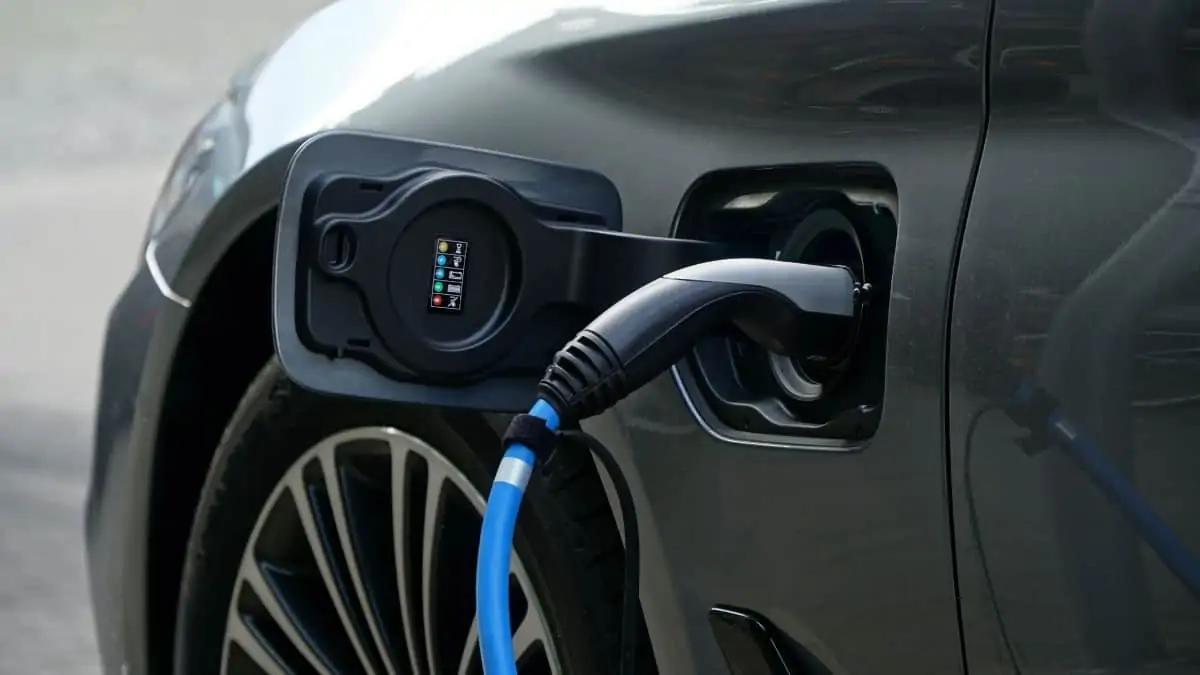As electric cars become more affordable globally, we are seeing more interest in electric cars than ever before. In this guide, We have reviewed our picks for ‘best electric car 2023‘ – giving you the information you need to invest in the right electric car for you.
| Brand | Vehicle | Vehicle Type | Warranty | Price Range |
|---|---|---|---|---|
| 1. Kia | Soul EV | All-electric | 7-year / 100,000 miles | $35,000 - $40,000 |
| 2. Audi | e-Tron | All-electric | 3-year warranty with limited miles | $64,000 - $159,000 |
| 3. Tesla | Model 3 | All-electric | 4-year warranty with unlimited miles | $37,990 - $54,990 |
| 4. BMW | i3 | All-electric | 3-year warranty with unlimited miles | $44,450+ |
| 5. Nissan | Leaf | All-electric | 5-year warranty with unlimited miles | $31,600 - 43,900 |
| 6. Tesla | Model S | All-electric | 4-year / 80,000 mile warranty | $79,990 - $99,990 |
| 7. Hyundai | Kona Electric | All-electric | 5-year / 100,000 miles | $37,000 - $42,000 |
| 8. Ford | Focus Electric | All-electric | N/A | $20,000 - $25,000 |
| 9. Honda | Clarity Plug-in Hybrid | Hybrid Electric | 3-year / 36,000-mile warranty | $33,400 - $36,620 |
| 10. Toyota | Prius Prime | Hybrid Electric | 3-year / 36,000-mile warranty | $27,900 - $33,800 |
| 11. Jaguar | I-Pace | Hybrid Electric | 5-year / 60,000 mile warranty | $69,850 - $80,900 |
| 12. Subaru | Crosstrek Hybrid | Hybrid Electric | 3-year / 36,000 mile warranty | $35,145+ |
| 13. Chrysler | Pacifica Hybrid | Hybrid Electric | 5-year / 60,000 mile warranty | $39,995+ |
| 14. Kia | Optima Plug-In Hybrid | Hybrid Electric | 5-year / 60,000-mile warranty | $29,310 - $36,090 |
| 15. MINI | Cooper Countryman Plug-In Hybrid | Hybrid Electric | 4-year /50,000-mile warranty | $36,900+ |
All-Electric Vehicles
In this section, TheCarXpert will review the best electric cars on the road in 2023. For each vehicle, we will break down the price range, door options, full warranty, advantages, and disadvantages – giving the top cars in each category the title of ‘best electric car 2023’.
1. Kia Soul EV
Our Pick For Best All Electric Car 2023
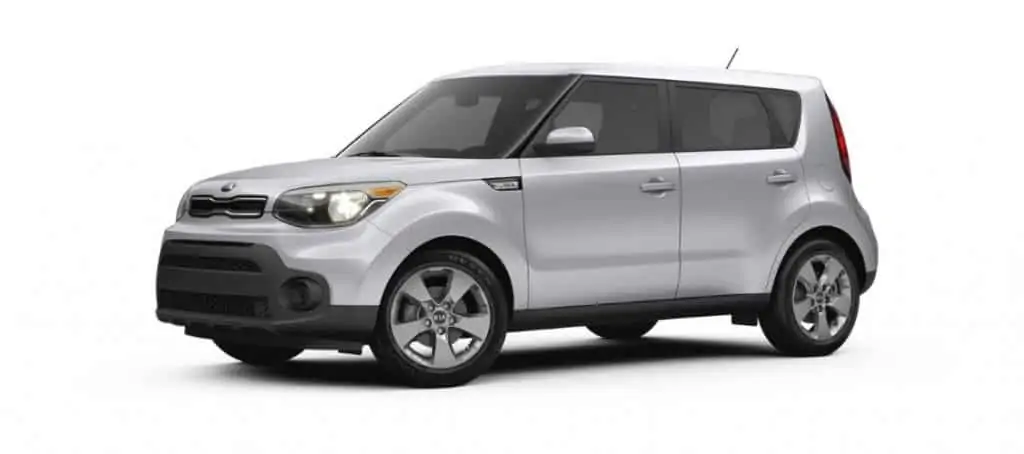
Brand: Kia
Price Range: $35,000 – $40,000
Door Options: 4 doors + boot
Full Warranty: 7 years / 100,000 miles
Advantages:
The Kia Soul EV is a sleek, stylish SUV-style all-electric vehicle. The Kia Soul was first introduced in South Korea in 2014 and is now popular globally. The 2020 release has the longest range, reaching 243 miles before recharging is required. The Kia Soul has plenty of space in the body of the vehicle, making it perfect for families.
As it is affordable and practical for most drivers, TheCarXpert has given the Kia Soul the title for ‘Best Electric Car 2023’
Disadvantages:
The Kia Soul is very affordable and compact but has limited boot space. The car is also fairly low on the ground, and may not be suitable for non-paved roads. The 2016 and 2018 editions of the vehicle also have a limited range, at 93 miles and 111 miles, respectively.
2. Audi e-Tron
Runner Up For Best All Electric Car 2023
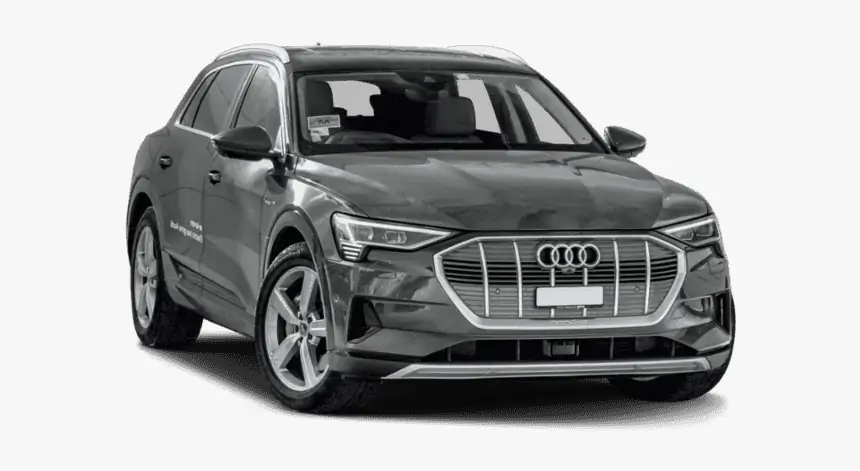
Brand: Audi
Price Range: $64,000 – $159,000
Door Options: 5 doors + boot
Full Warranty: 3 years warranty with limited miles
Advantages: The Audi e-Tron is one of the best electric cars ever produced. It is stylish, technologically advanced, and extremely practical.
The basic edition of the vehicle has a range of 204 miles, the updated version has a range of 222 miles and the Sportback edition has a range of 2018 miles. Unlike other electric vehicles, the e-Tron can be charged quickly – charging from 0% to 80% charge in 30 minutes.
The e-Tron is also full of options and features, allowing the driver to personalize the charger, battery, and car specifications to their preferences. The car also features an energy recuperation system (similar to a hybrid-electric vehicle), giving it extra battery life.
The Audi e-Tron is so popular that the New Zealand government uses e-Tron’s as their official vehicle.
Disadvantages: The Audi e-Tron has experienced several production delays, which left US drivers waiting several months for new cars. As of 2023, these issues have subsided. The e-Tron is also a very heavy vehicle at 5,640+ pounds – which may be a deal-breaker for some drivers.
3.Tesla Model 3
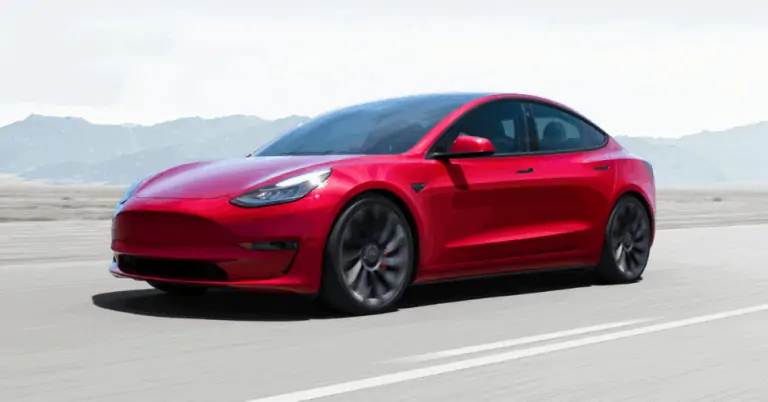
Brand: Tesla
Price Range: $37,990 – $54,990
Door Options: 4 doors + boot
Full Warranty: 4-year warranty with unlimited miles
Versions Available: Standard Range RWD, Standard Range Plus RWD, Mid Range RWD, Long Range RWD, Long Range AWD
Advantages:
The Tesla Model 3 is one of the most recognizable all-electric vehicles globally, with a reputation that precedes it. The Model 3 is the world’s best-selling electric car, with hundreds of vehicles in circulation.
The Model 3 comes with three lithium-ion battery option sizes – 54 kWh, 62 kWh, and 75 kWh. This gives it excellent range and makes it great for long trips. Depending on the version, the Tesla Model 3 can drive 263 – 313 miles before needing to be recharged.
The Model 3 is also an extremely safe vehicle. After testing from the National Highway Traffic Safety Administrator, the car was given five stars in each category.
Disadvantages: While owning a Tesla is a dream of many car enthusiasts, it doesn’t come cheap. The Tesla Model 3 is fairly expensive – although the cost of the vehicle could drop in the coming years as production increases.
Tesla’s self-driving technology is also an expensive extra, as it is still early days for the technology.
4. BMW i3
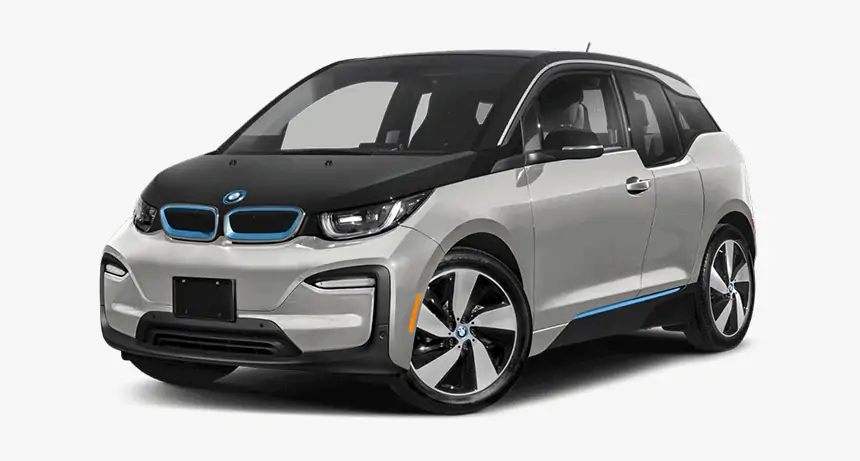
Brand: BMW
Price Range: $44,450+
Door Options: four doors + boot
Full Warranty: three-year warranty with unlimited miles
Versions Available: 2014, 2015, 2016, 2017, 2018, i3s, 2019
Advantages:
The BMW i3 is one of the top-selling electric vehicles worldwide, with its fame dating back to 2013. Since then, it has won two World Car of the Year Awards: the 2014 World Green Car of the Year and the 2014 World Car Design of the Year.
The vehicle is designed as a city car, with several lithium-ion battery sizes available. This includes 18.2 kWh, 27.2 Kwh, and 37.9 kWh batteries with ranges of 81 miles, 114 miles, and 153 miles, respectively. Certain models are also available with fuel tanks for longer trips.
The BMW i3 is also one of the first cars to use alternative materials to reduce the weight of the vehicle. This includes a carbon-fiber-reinforced plastic (CFRP) body and doors made of hemp fiber.
Disadvantages: While the BMW i3 has four doors, it is a small car designed for use in the city. Naturally, this vehicle is not suited to large families or drivers who frequently need to drive long distances.
5. Nissan Leaf
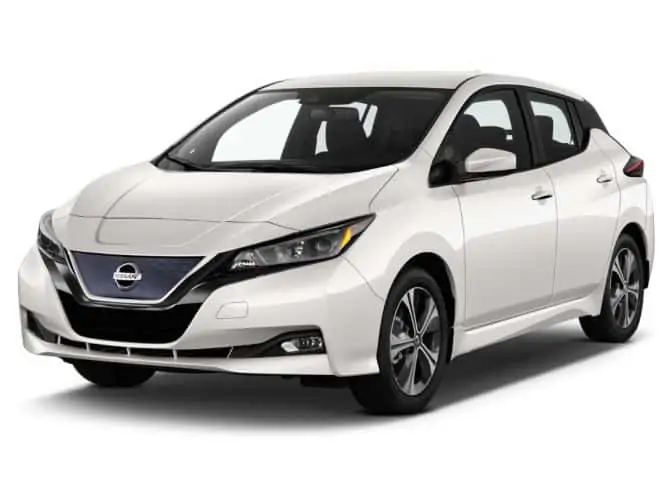
Brand: Nissan
Price Range: $31,600 – 43,900
Door Options: 4 doors + boot
Full Warranty: 5-year warranty with unlimited miles
Advantages:
The Nissan Leaf is a world-renowned city car, making it a popular choice for young drivers, couples, and small families. There are hundreds of thousands of Nissan Leafs on the road in the US, as the Leaf was the world’s all-time best selling electric vehicle until 2020.
The Nissan Leaf has two battery sizes. The standard models come fitted with a 40 kWh battery that gives it 147 horsepower and a 149 mile range. The Leaf Plus comes fitted with a 62 kWh battery, which gives it 214 horsepower and a range of 226 miles.
The vehicle is also renowned for its environmental footprint and safety rating. When tested by NCAP in 2019, the Leaf was given five stars, with a 10/10 Clean Air Index and a 8.5/10 Energy Efficiency Index.
Drawbacks: The Nissan Leaf can accommodate a maximum of five passengers, however, it has a small size. It is more suitable for small households, pairs, or solitary motorists dwelling within cities.
The boot space in the Nissan leaf is also very limited, and the backseats of the car do not fold. Later models are also beginning to look a little bit dated inside, as the dashboard has not had a proper make-over recently.
6. Tesla Model S
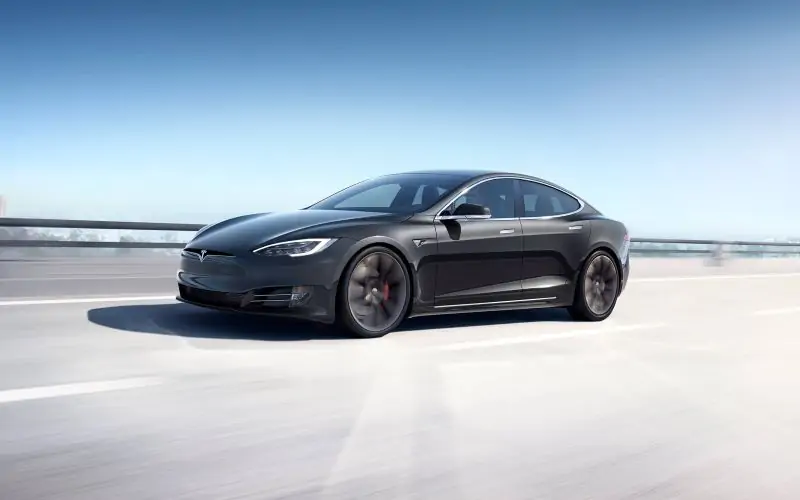
Brand: Tesla
Price Range: $79,990 – $99,990
Door Options: 4 doors + boot
Full Warranty: 4 years / 80,000 mile warranty
Advantages:
The Tesla Model S is a high-performance vehicle with a host of luxury features. It has a 100 kWh lithium-ion battery and two electric motors, giving it the fastest acceleration of any electric vehicle. To be specific, the standard release goes 0 – 60 mph in 3.7 seconds and the Performance release travels 0 – 60 mph in 2.4 seconds.
The Model S also has a very long range, making it the best electric vehicle for long drives. Depending on the conditions and battery, the vehicle can travel 348 – 390 miles without needing to be charged.
Disadvantages: While the Tesla Model S is an iconic vehicle, it is one of the most expensive electric vehicles on the market. Even with government subsidies, the cost of buying, insuring, and maintaining a Model S is high – which may price many buyers out of the market.
The Model S is an all-wheel-drive, meaning it may not be suitable for everyone. The vehicle also has a low center of gravity, and a short roof, so buyers should test the model thoroughly before investing.
7. Hyundai Kona Electric
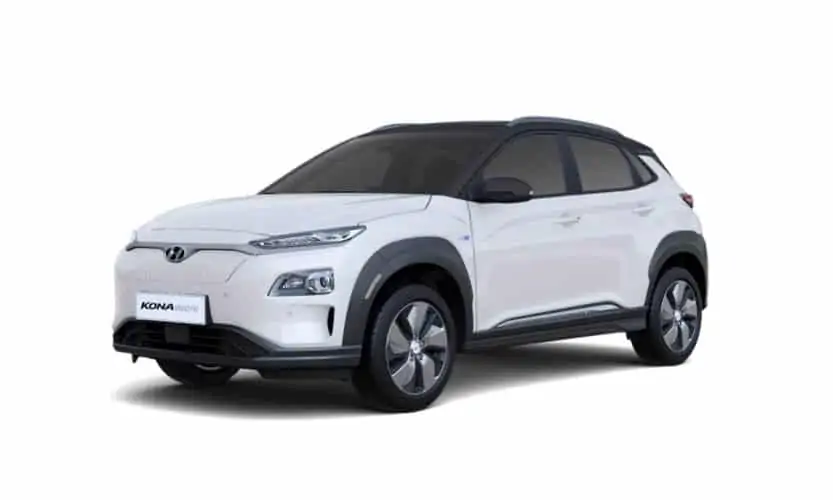
Brand: Hyundai
Price Range: $37,000 – $42,000
Door Options: 4 doors + boot
Full Warranty: 5 years / 100,000 miles
Advantages: The Hyundai Kona Electric is the electric version of the Hyundai Kona vehicle. It was first released in Korea in 2017 and is now one of the most popular electric vehicles in America. The vehicle is available as a hybrid and as an all-electric vehicle, with two battery versions available: 39.2 kWh and 64 kWh.
The latest Kona Electric has a decent range for an electric car and can travel 258 miles between charges. This makes it great for families who frequently drive long distances.
Disadvantages: Over 11,000 Kona Electric vehicles from the US and Canada were recalled in October 2020, after it was found that an issue with the battery had the potential to start a fire. As Hyundai promises these issues do not affect new vehicles, buyers purchasing an older or second-hand Kona Electric should investigate the vehicle’s history thoroughly.
8. Ford Focus Electric
Special Mention
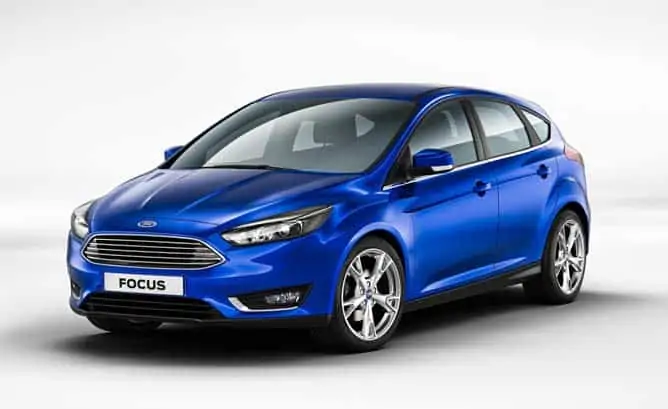
Brand: Ford
Price Range: $20,000 – $25,000
Door Options: 5 doors + boot
Full Warranty: Not Applicable
Advantages:
The Ford Focus Electric was one of the best electric cars of the 2010s, so it deserves a special mention on any ‘best electric car 2023’ list.
The Focus carries either a 22kWh or 33.5 kWh lithium-ion battery, giving it a range of either 76 miles or 115 miles, respectively. The vehicle was also named the most fuel-efficient car sold in the US, winning it the 2011 Green Car Vision Award.
Although production on this vehicle has now ceased, it is still an excellent car to buy second-hand. As the value of the car remains strong, we have chosen to include it for budget-conscious drivers.
Disadvantages: As production of the Ford Focus has been discontinued, no new models of the vehicle are available. The vehicle also has a limited range, making it suitable for city-driving only.
9. Honda Clarity Plug-in Hybrid
Our Pick For Best Plug-In Hybrid Car 2023
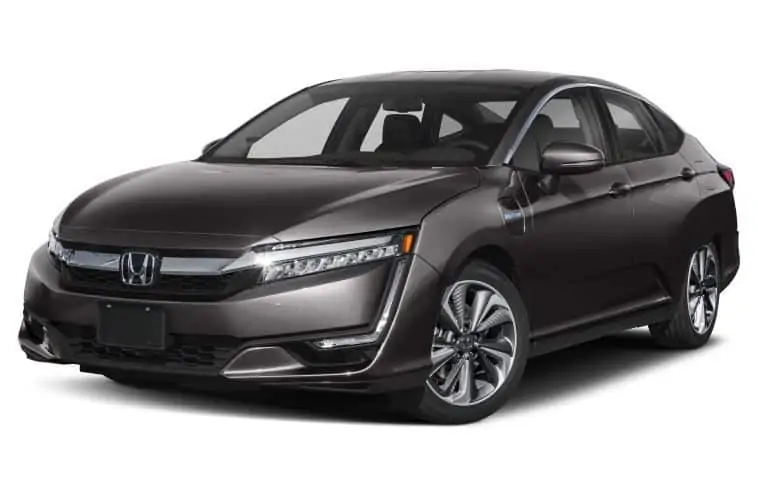
Brand: Honda
Price Range: $33,400 – $36,620
Door Options: 4 doors + boot
Full Warranty: Three years / 36,000-mile warranty
Advantages:
The Honda Clarity Plug-in Hybrid is an alternative version to the Honda Clarity that was first released in 2018. The Plug-in Hybrid version hosts a 1.5-liter four-cylinder engine and a lithium-ion battery pack. This gives it 103 – 212 horsepower.
The Honda Clarity Plug-in Hybrid can travel 47 miles between charges, with the combustion engine carrying the vehicle a further 293 miles on a full engine. For this reason, the vehicle is a front-wheel-drive vehicle best suited to city driving. The Honda Clarity scored a ‘Good’ rating on its latest IIHS safety test.
As the Honda Clarity is a safe, affordable hybrid electric car, we gave it the title of ‘Best Electric Car 2023’ in the ‘Plug-In Hybrid’ category.
Disadvantages: The infotainment system on the Honda Clarity is often described as “frustrating” to use, as it has a slow touch screen and distracting layout.
10. Toyota Prius Prime Hybrid
Runner Up For Best Plug-In Hybrid Car 2023
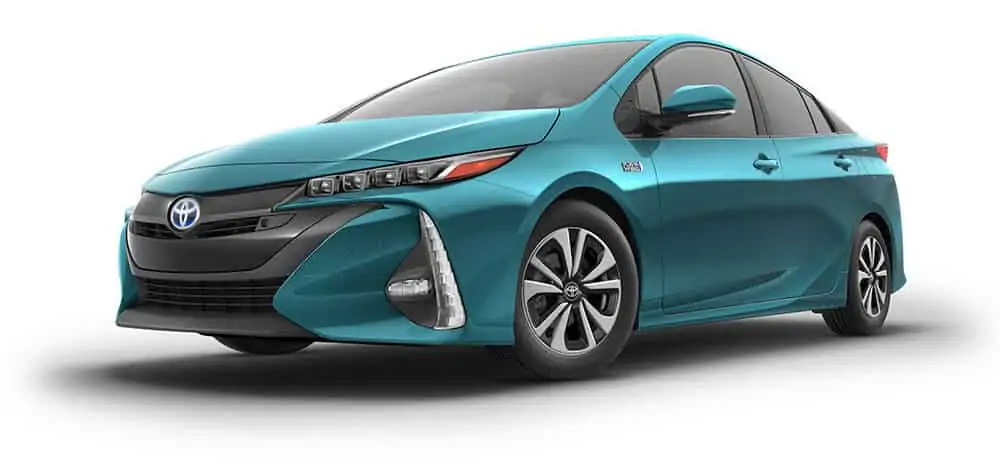
Brand: Toyota
Price Range: $27,900 – $33,800
Door Options: 4 doors + boot
Full Warranty: Three years / 36,000-mile warranty
Advantages:
The Toyota Prius Prime Hybrid is a classic hybrid vehicle with plenty of advantages as a city car. It features a comfortable interior, sleek design, and plenty of safety features.
Prius Prime Hybrid vehicles made in 2017 or later have an 8.8 kWh battery and two electric motors. This gives the vehicle a range of 25 miles. After that, the car runs for another 600+ miles with gas. The vehicle also has between 95 and 121 horsepower and is a front-wheel drive.
The Prius Prime Hybrid was given a ‘Good’ on its Insurance Institute for Highway Safety (IIHS) Safety Ratings test, putting it ahead of many other plug-in hybrid electric vehicles. In Japan, many Prius Prime’s are semi-powered with solar panels – which we may see in local vehicles soon. The 2020 release includes five seats, instead of four.
As the Toyota Prius is a low-cost, family-friendly option, we have marked it as runner up for the title of ‘Best Electric Car 2023’.
Disadvantages: The Prius Prime has less horsepower than many of the other options on this list, making it best suited for city drivers on sealed roads.
11. Jaguar I-Pace
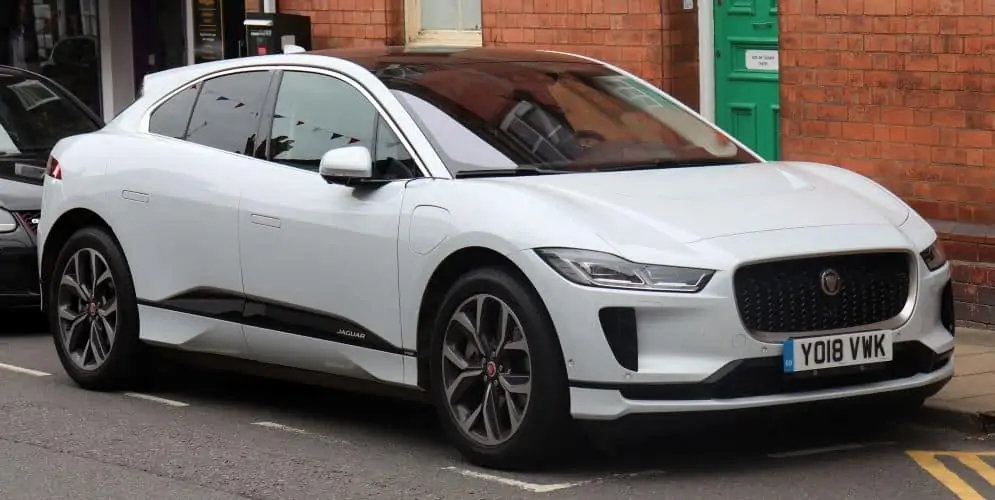
Brand: Jaguar
Price Range: $69,850 – $80,900
Door Options: 4 doors + boot
Full Warranty: Five years / 60,000-mile warranty
Advantages:
The Jaguar I-Pace is a powerful hybrid vehicle that is thrilling, comfortable, and luxurious. The vehicle is fitted with modern seats, a posh interior, and 25.3 cubic feet of cargo space.
The I-Pace is an all-wheel-drive fitted with a combustion engine and two lithium-ion batteries. This gives the I-Pace an all-electric range of 234 miles – which is the best all-electric range of a hybrid vehicle. The I-Pace is a performance car that runs at 394 horsepower.
When tested by EURO NCAP in 2018, the Jaguar I-Pace was given 5 stars for its safety features.
Disadvantages: The Jaguar I-Pace is a luxury vehicle that comes with a luxury price tag. Although it is often compared to the Tesla Model S, the Jaguar I-Pace is the inferior vehicle of the two.
Unfortunately, the infotainment system is also prone to software bugs.
12. Subaru Crosstrek Hybrid

Brand: Subaru
Price Range: $35,145+
Door Options: 4 doors + boot
Warranty: 3 year / 36,000 mile warranty
Advantages: The Subaru Crosstrek Hybrid is a sporty SUV suitable for eco-conscious drivers, adventurous couples, and small families. The car sits five people, offers great fuel economy, and is suitable for driving on unpaved roads.
The Crosstrek Hybrid is an all-wheel-drive with a four-cylinder combustion engine and two electric motors. This gives it 148 horsepower, and an all-electric range of 17 miles. The vehicle also charges fairly quickly, reaching full-charge after five hours with a 120-volt outlet and 2 hours with a 240-volt outlet. The Crosstrek Hybrid measures 14.7 feet and weighs 3,717 pounds – making it one of the smallest family SUVs on this list.
In its IIHS safety test, the Crosstrek Hybrid was given a ‘Good’ rating in all categories.
Disadvantages: The cargo space in the Subaru Crosstrek Hybrid is quite limited for a family SUV, offering just 15.9 cubic feet of space on the boot. With the rear seats of the vehicle folded, this extends to 43.1 cubic feet – which is still smaller than many other hybrid SUVs.
13. Chrysler Pacifica Hybrid
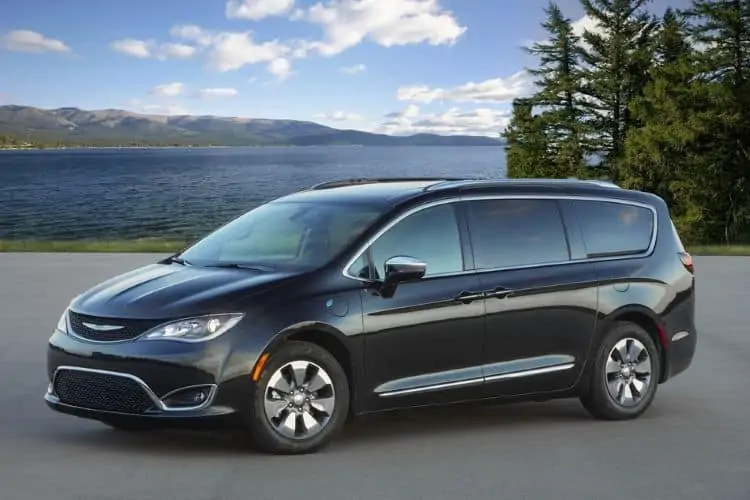
Brand: Chrysler
Price Range: $39,995+
Door Options: Five doors + boot
Full Warranty: 5 years / 60,000 miles
Advantages:
The Chrysler Pacifica Hybrid is a large, family car that combines the benefits of internal combustion engines and electric engines into an affordable SUV. Technically a minivan, the Pacifica seats seven people across three rows. It has a gross weight of 6,300 pounds and is 17 feet long. Safe to say, it is a fairly spacious car to travel in.
Although the car is large, it is also powerful with 260 horsepower. That power comes from its electric, and combustion engines – meaning the mileage of the car isn’t limited to the city. The Pacifica has an electric range of 32 miles, which is decent for a hybrid of its size. The Pacifica is also well-rated for safety, scoring a ‘good’ in its IIHS assessment.
Disadvantages: While the Pacifica has great fuel economy for its size, it is still a large car. The vehicle is loud, low-to-the-found, and expensive for an family car. It is also a front-wheel-drive, which won’t suit many drivers.
14. Kia Optima Plug-In Hybrid
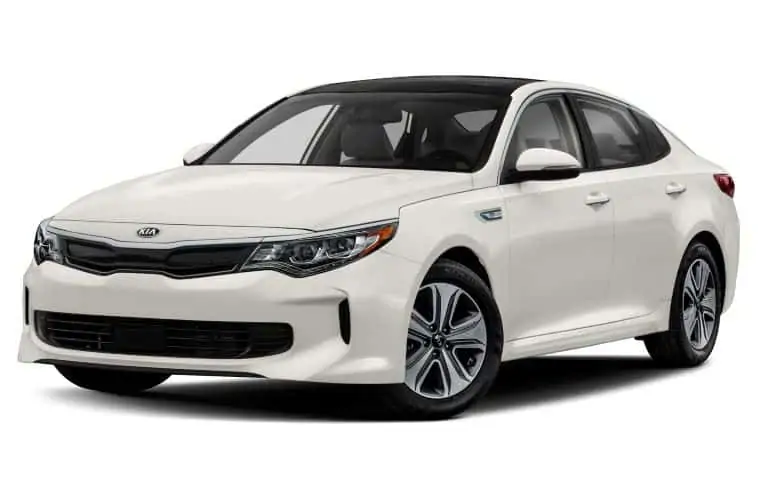
Brand: Kia
Price Range: $29,310 – $36,090
Door Options: 4 doors + boot
Full Warranty: five year / 60,000-mile warranty
Advantages:
The Kia Optima Plug-in Hybrid is a low-cost hybrid vehicle perfect for families. The vehicle itself is a large SUV, measuring 15.9 feet with a curb weight of 3,799 pounds. This gives it fairly good fuel-efficiency and makes it a great car for many environments.
The Optima has a 2.4-liter MPI engine and a 30 kWh electric motor, giving it between 192 and 202 horsepower.
Disadvantages: While the fuel economy of the Optima is decent enough that the vehicle was awarded a Guinness World Record for ‘Lowest Fuel Consumption in a Hybrid Gasoline Vehicle’ in 2011, other hybrid vehicles have since surpassed its record. Today, drivers who value fuel economy are better off choosing a Chrysler Pacifica, Honda Accord Hybrid, or a Ford Fusion Hybrid, as these are comparable hybrid SUVs.
15. MINI Cooper Countryman Plug-In Hybrid

Brand: MINI
Price Range: $36,900+
Door Options: Four doors + boot
Full Warranty: Four years/50,000-mile warranty
Advantages:
The MINI Cooper Countryman Plug-in Hybrid is a nippy, cute little car for city drivers. The vehicle includes a combustion engine and a lithium-ion battery, giving it 134 – 301 horsepower.
The Cooper Countryman is well-known for its long list of safety features. When it was last tested by IIHS in 2020, it was given a ‘Good’ rating. The car also offers 17.4 cubic feet of boot space or 47.4 cubic feet with the rear seats folded.
The Cooper Countryman can run 17 miles on all-electric power, making it perfect for short trips.
Disadvantages:
The Cooper Countryman is an expensive car that is only practical for drivers living in the city. The vehicle also takes a long time to recharge, as it takes 2.5 hours on a 240-volt outlet to fully recharge the battery.
How Do Electric Cars Work?
As electric cars do not run on diesel or gasoline, they are an environmentally-friendly alternative to traditional vehicles … but how do they work?
Traditional cars run with an internal combustion engine that uses gasoline or diesel to power the vehicle. Electric cars, on the other hand, are powered with electricity from the grid.
Electric cars are charged with charging units plugged into the wall of your garage. When charged, the car stores electricity in rechargeable batteries. These batteries then supply power to the vehicle, turning its battery on and running its engine. Electric vehicles can be recharged anywhere with a compatible charging station.
Parts Of An Electric Car
While internal combustion engines require many moving parts to run an engine, electric vehicles only have five main components.
#1. The Electric Engine
The electric engine is the part that provides the power used to rotate the wheels of the car. Electric engines are available in two types – Alternating Current (AC) and Direct Current (DC). AC electric engines are more common in today’s electric vehicles, but DC engines are still widely available.
#2. The Inverter
The ‘inverter’ is the part of the vehicle that converts DC into AC. This allows the inverter to change the speed of the car’s motor.
#3. The Drivetrain
The ‘drivetrain’ is the part of the vehicle that sends powers from the electric engine to the wheels. Electric cars use a single-speed transmission.
NOTE:
Electric cars do not use ‘gear’s the way other cars do. The gears in combustion engines are used to generate the torque that allows the car to accelerate. Gears do this by generating RPM (revolutions per minute).
Electric cars generate torque at very low speeds (as in, less than 1,000 RPM). This means they don’t need to use the gear system to generate torque.
#4. The Batteries
Electric Vehicle Batteries (EVB’s) store the electricity the car needs to run. These batteries consist of thousands of small battery cells. While the design of the battery depends on the car manufacturer, there are two main types of EVB:
- Lithium-ion batteries, which are used in Teslas and Jaguars.
- Nickel-metal hydride batteries, which are used in many hybrid vehicles.
NOTE: If you’d like to learn more about batteries, check out our guide to the best car batteries.
#5. The Charging Station
All-electric cars are charged through their charging station. These charging stations are usually located over the back wheels of the vehicle – similar to the fuel tank in a gasoline or diesel car.
Types Of Electric Car
There are three types of electric cars, including all-electric cars, plug-in hybrid cars, and hybrid electric cars.
All-Electric Cars
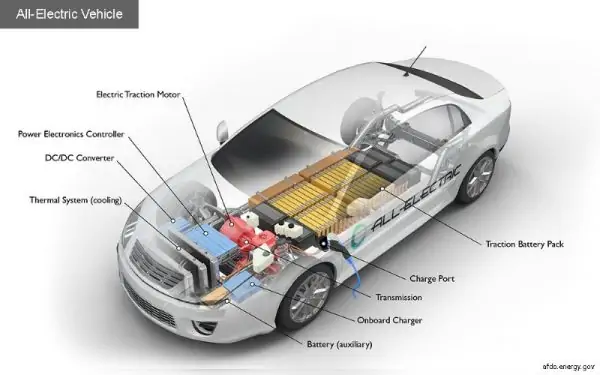
All-electric cars run purely on electricity. This means they do not include an internal combustion engine, and cannot take diesel or gasoline. Popular examples of all-electric cars include:
- Jaguar I-Pace
- Hyandai Kona Electric
- Mercedes EQC
- Tesla Model 3
Plug-in Hybrid Cars
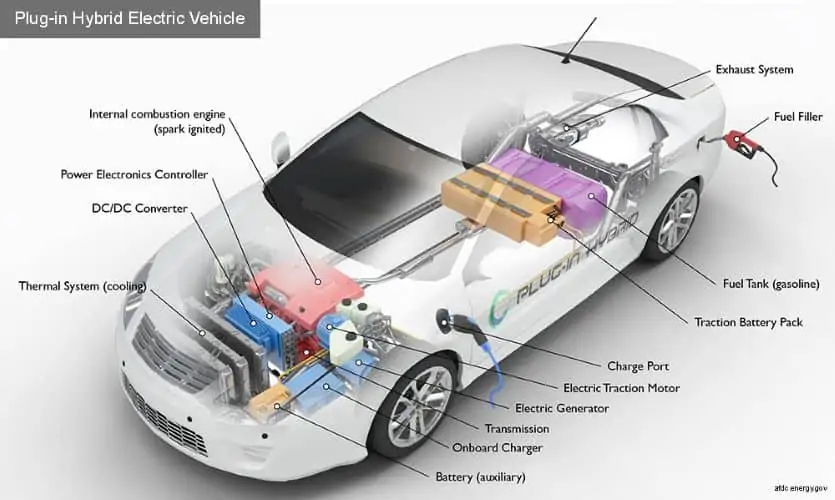
Plug-in Hybrid Cars (PHEV’s) have both an electric engine, and a traditional internal combustion engine. These cars usually run on electric-mode and switch to using gasoline or diesel when the electric battery runs out. Popular examples of plug-in hybrid cars include:
- Hyundai IONIQ
- Mitsubishi Outlander
- Toyota Prius Prime
- Honda Clarity
Hybrid-Electric Cars
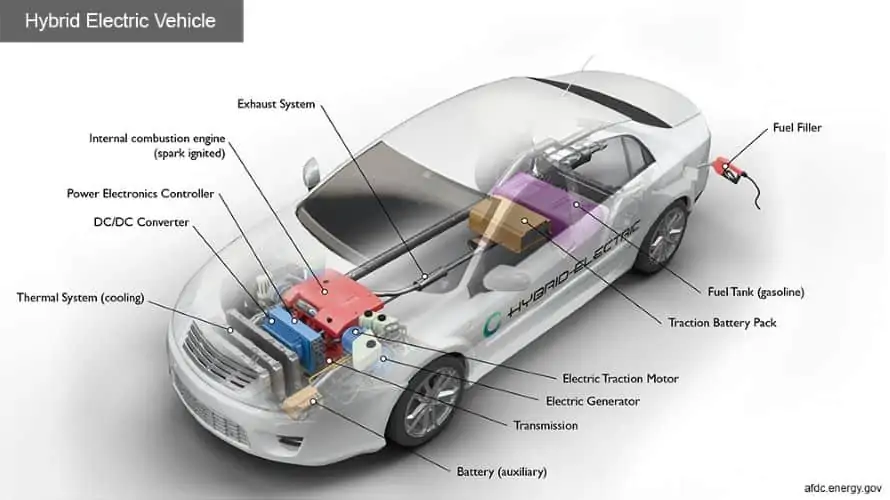
Hybrid-Electric Cars primarily use an internal combustion engine but include an electric battery. This battery is charged through regenerative braking, meaning hybrid-electric cars cannot be charged with an electric charging station. Popular examples include:
- Honda Jazz
- BMW i3
Frequently Asked Questions (FAQ)
What Is The Best Electric Car For The Money?
The Kia Soul EV and the Nissan Leaf are the most affordable all-electric vehicles on the market in 2023. Alternatively, the Honda Clarity and the Kia Niro Plug-In Hybrid are very affordable semi-electric cars.
How Do Electric Cars Run?
Electric cars run from an electric engine, as opposed to an internal combustion engine. Electric cars draw power from the grid and use this power to charge their batteries. Most electric cars can run at least 130 miles between charges.
Are Electric Cars Worth It?
Electric cars are an expensive up-front investment with many benefits. When compared to combustion vehicles, electric cars are quieter, cheaper to run, and more convenient to maintain. They also reduce fewer carbon emissions, making them great for the environment.
Advantages And Disadvantages
There are many advantages and disadvantages to buying an electric car – each of which you should consider before making your purchase.
Advantages
Electric cars are great for the environment, as they produce fewer carbon emissions than gasoline and diesel cars. Fewer carbon emissions mean less pollution and greenhouse gas, both of which are heavily contributing to global warming.
Electric cars are more convenient for some drivers, as they can be charged at home. Charging with electricity is also more affordable long-term, as the cost of running your car isn’t subject to the price of fossil fuels (plus, no need to change your oil filter).
Disadvantages
All-electric cars are not suitable for drivers who are traveling long distances, as charging ports are not portable. While there are charging points in many major cities, it takes several hours to fully recharge an electric car.
Many electric cars are also very expensive, as the cost of manufacturing them is high. While this cost is decreasing as more cars are released, it still pushes many drivers to cars with traditional combustion engines.
NOTE!
In many jurisdictions, governments are giving citizens subsidies for buying electric cars, which can offset the high cost. Always check if a subsidy is available in your region.
Conclusion
Purchasing an electric car is an investment for you and the future of the planet. Many governments worldwide have declared electric cars the ‘way of the future’, meaning that most drivers will eventually embrace electric vehicles.
Whether you are looking for a family car, a city-SUV, or a Tesla, there are many great electric cars to choose from in 2023.

Garry is the happy owner of a funky 2018 Nissan Juke Ti-S AWD. After growing up around his family’s mechanics shop, he is passionate about bringing budget-friendly car care to every driver. Garry has a business degree and is a car enthusiast.

